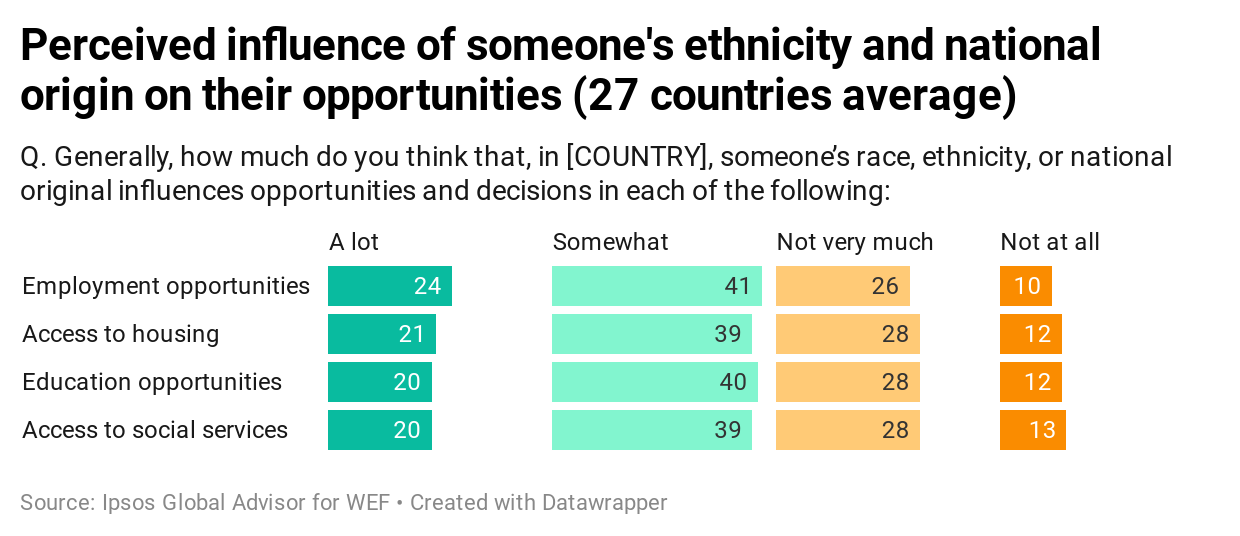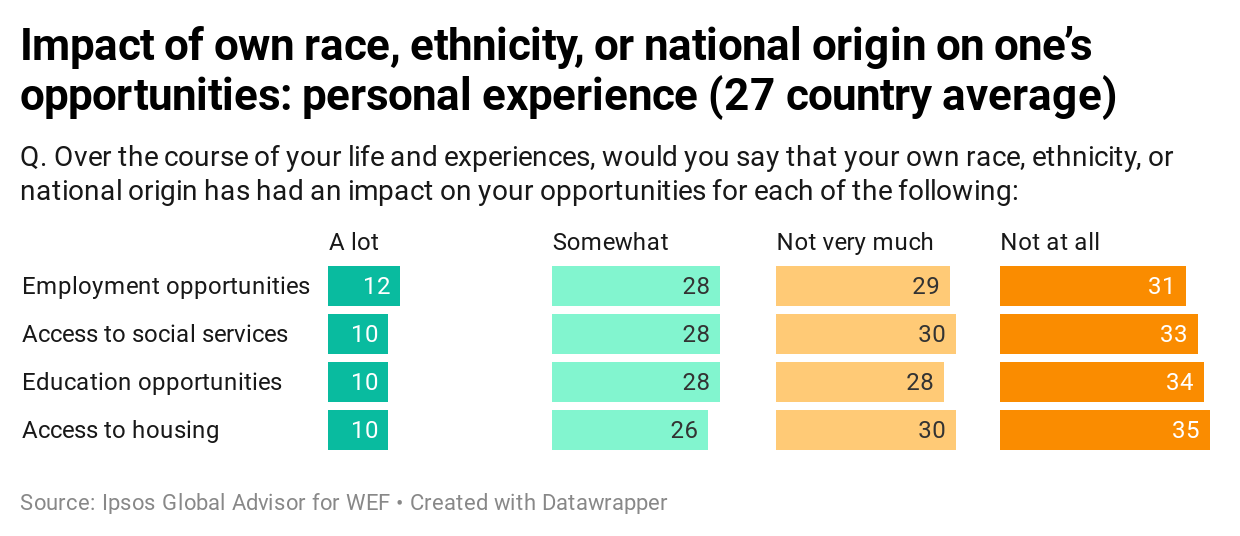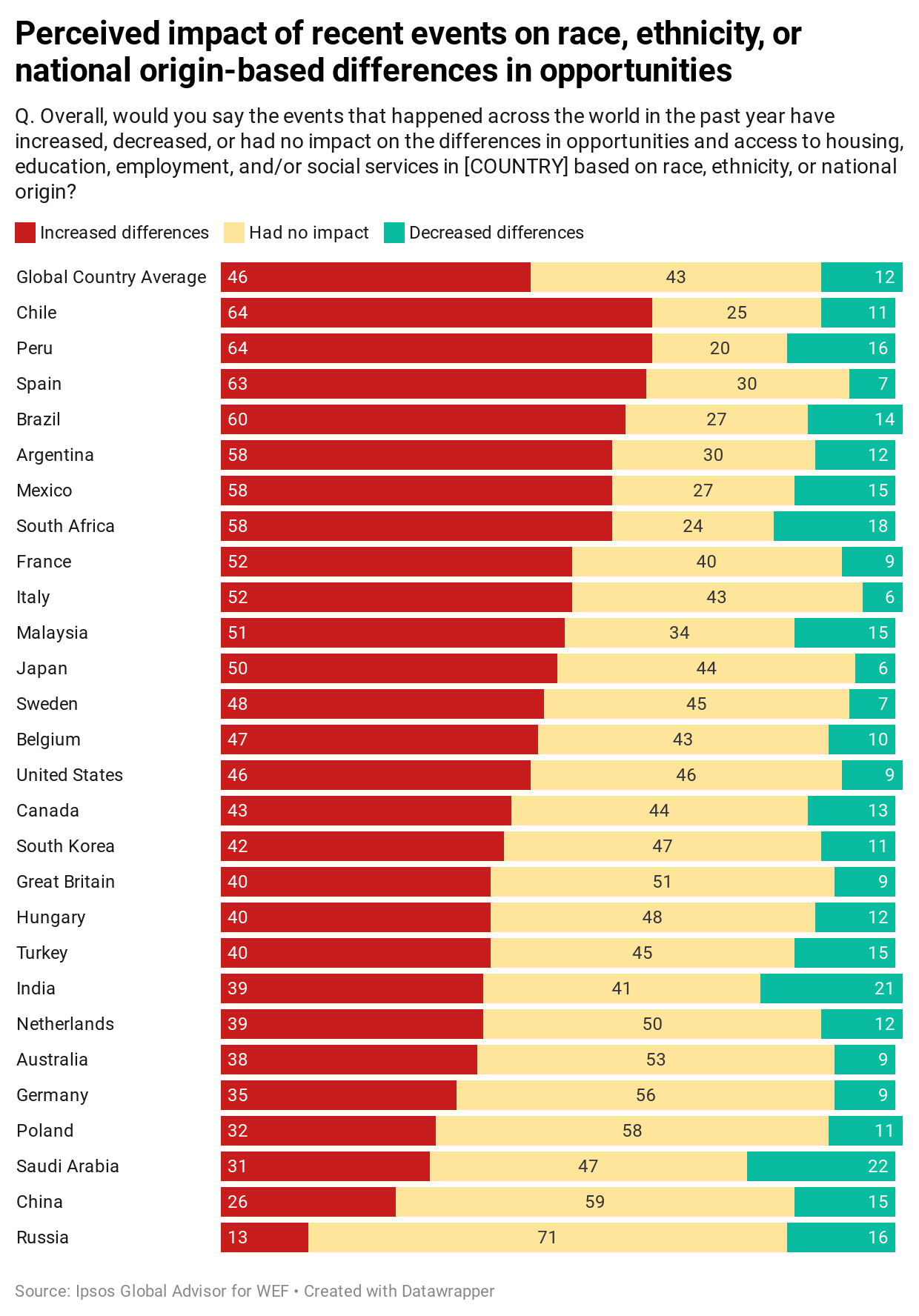The impact of race, ethnicity, and national origin on opportunities: Perceptions and personal experience
New York, NY, February 26, 2021 — A new Ipsos survey for the World Economic Forum finds that across the 27 countries surveyed, an average of 65% of all adults think that, in their country, someone’s race, ethnicity, or national origin influences their employment opportunities. When considering their own race, ethnicity, or national origin, an average of 39% say it has impacted their own employment opportunities.
The online survey conducted between January 22 and February 5, 2021 among more than 20,000 adults in 27 countries also reveals that, on average, 60% of adults perceive someone’s race, ethnicity or national origin plays a role in each of their education opportunities, their access to housing, and their access to social services in their country. On average, 38% report that their own race, ethnicity, or national origin has impacted their own education opportunities, 38% their own access to social services, and 35% their own access to housing. However, for each type of opportunity, about one-third say their race, ethnicity, or national origin has not had any influence at all.
On average, across the 27 countries surveyed, 46% say the events that have happened across the world in the past year have increased differences in opportunities and access to housing, education, employment and/or social services in their country, compared to 43% who say the events have had no impact on differences and 12% who say they have decreased differences.
Detailed Findings
Perceived influence of someone’s ethnicity and national origin on their opportunities
- An average of 65% across the 27 countries think that, in their country, someone’s race, ethnicity, or national origin influences employment opportunities (“a lot” for 24% and “somewhat” for 41%):
- From more than seven in ten in South Africa (79%), Japan (78%), Belgium (74%), Canada (73%), the Netherlands (73%), and Brazil (71%), to less than half in Malaysia (44%).
- On average, 60% consider someone’s race, ethnicity, or national origin influences their access to housing:
- From two-thirds or more in South Africa (75%), India (74%), Belgium (73%), France (70%), Germany (69%), Japan (69%), and the United States (67%), to less than half in Russia (38%), China (44%), Poland (46%), and Argentina (48%);
- Again, 60% also think it has an impact on their education opportunities:
- From at least two-thirds in South Africa (76%), India (73%), Chile (68%), Brazil (68%), South Korea (67%), and Japan (67%), to less than half in Russia (39%), Sweden (47%), and Poland (47%);
- And 60% also think it impacts their access to social services:
- From more than two-thirds in South Africa (74%), India (74%), Japan (69%), Brazil (68%), and
- Mexico (67%) to only 49% in Sweden and 42% in Russia.

Impact of own race, ethnicity, or national origin on one’s opportunities: Personal experience
- On average, 39% across the 27 countries surveyed say their own race, ethnicity, or national origin has had an impact on their own employment opportunities over the course of their life (12% a lot and 28% somewhat):
- More than half in South Africa (67%) and India (64%) report having had this experience whereas roughly half in France (56%), Hungary (49%), and Russia (49%) say it has not been the case at all;
- On average, 38% on average say their race, ethnicity or national origin has impacted their education opportunities:
- More than half in India (65%), South Africa (62%), Malaysia (56%), and South Korea (55%) say it has while fewer than one in four in Russia (19%), Sweden (20%), and France (22%) do;
- Another 38%, say their own race, ethnicity, or national origin has had an impact on their access to social services:
- A clear majority of adults surveyed in India (68%), South Africa (58%), and Malaysia (56%) say they it has been the case for them compared to less than one in four in Russia (20%), Great Britain (23%), and Sweden (24%);
- Just over one third on average (35%), say it has influenced their access to housing:
- More than half in India (65%) and South Africa (57%) say so, compared to less than one in four who say the same thing in Russia (22%), Sweden (22%), Great Britain (23%), and France (23%).
Perceptions vs. personal experience
Perceptions and reported personal experience of how much race, ethnicity, or national origin impacts one’s opportunities varies greatly across countries. Compared with the 27-country average for all four types of opportunities measured, several countries stand out for particularly higher or lower levels of perceptions combined with particularly higher or lower levels of personal experience:
- High perception and high personal experience: South Africa and India
- High perception and low personal experience: Japan, Belgium, and France
- Low perception and high experience: Malaysia
- Low perception and low experience: Russia, Poland, Sweden, and Great Britain
Impact of recent events on differences in opportunities

- About six in ten across Latin America, Spain, and South Africa, and about half in France, Italy, Malaysia, Japan, Sweden, Belgium, and the U.S. say recent events have increased race, ethnicity, or national origin-based differences in opportunities in their country.
- Only about one in three in Germany, Poland, and Saudi Arabia, one in four in China, and one in seven in Russia say so.

About the Study
These are the results of a 27-country survey conducted by Ipsos on its Global Advisor online platform. Ipsos interviewed a total of 20,020 adults aged 18-74 in the United States, Canada, Malaysia, South Africa, and Turkey, and 16-74 in 22 other countries between January 22 and February 5, 2021.
The sample consists of approximately 1,000 individuals in each of Australia, Belgium, Brazil, Canada, China (mainland), France, Germany, Great Britain, Italy, Japan, Spain, and the U.S., and 500 individuals in each of Argentina, Chile, Hungary, India, Malaysia, Mexico, the Netherlands, Peru, Poland, Russia, Saudi Arabia, South Africa, South Korea, Sweden, and Turkey.
The samples in Argentina, Australia, Belgium, Canada, France, Germany, Great Britain, Hungary, Italy, Japan, the Netherlands, Poland, South Korea, Spain, Sweden, and the U.S. can be taken as representative of these countries’ general adult population under the age of 75.
The samples in Brazil, Chile, China, India, Malaysia, Mexico, Peru, Russia, Saudi Arabia, South Africa, and Turkey are more urban, more educated, and/or more affluent than the general population. The survey results for these countries should be viewed as reflecting the views of the more “connected” segment of their population.
The data is weighted so that each country’s sample composition best reflects the demographic profile of the adult population according to the most recent census data. Where results do not sum to 100 or the ‘difference’ appears to be +/-1 more/less than the actual, this may be due to rounding, multiple responses, or the exclusion of “don't know” or not stated responses.
The precision of Ipsos online polls is calculated using a credibility interval with a poll of 1,000 accurate to +/- 3.5 percentage points and of 500 accurate to +/- 4.8 percentage points. For more information on Ipsos’ use of credibility intervals, please visit the Ipsos website.
The publication of these findings abides by local rules and regulations.
